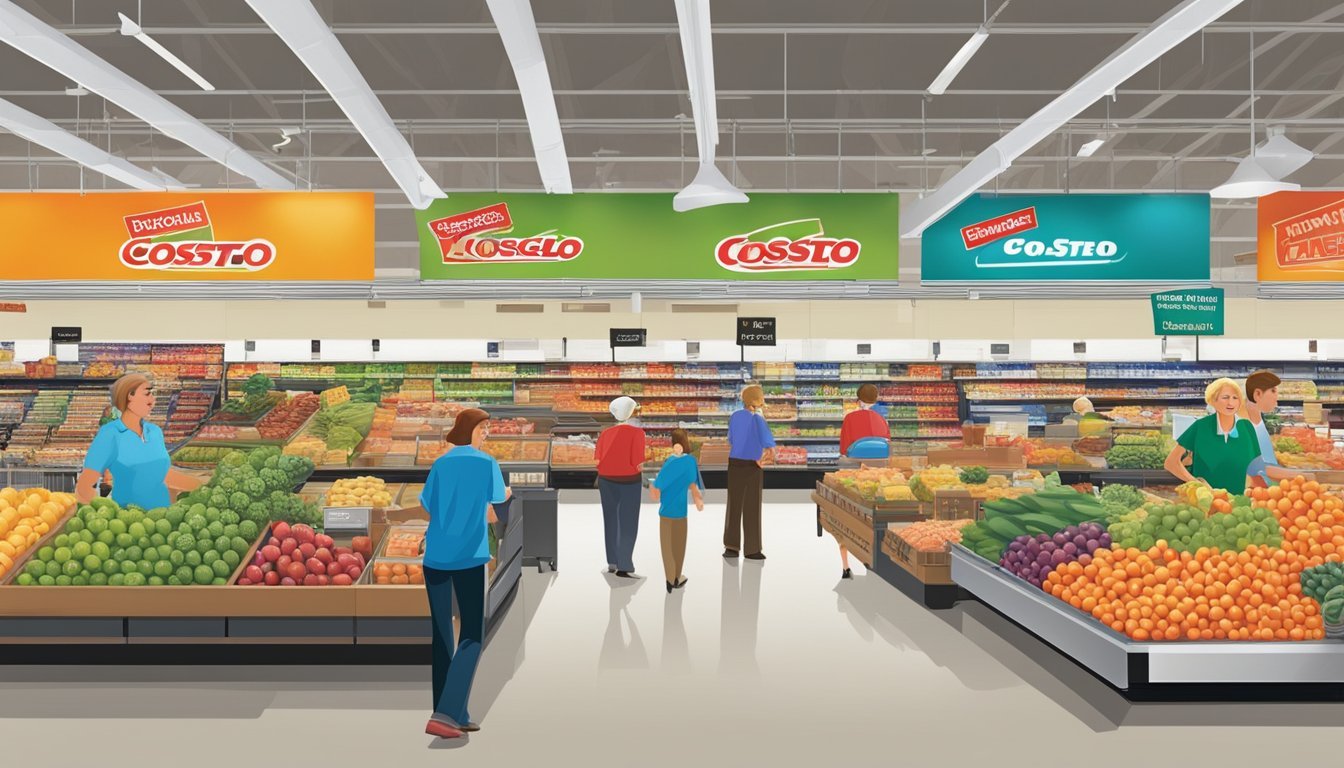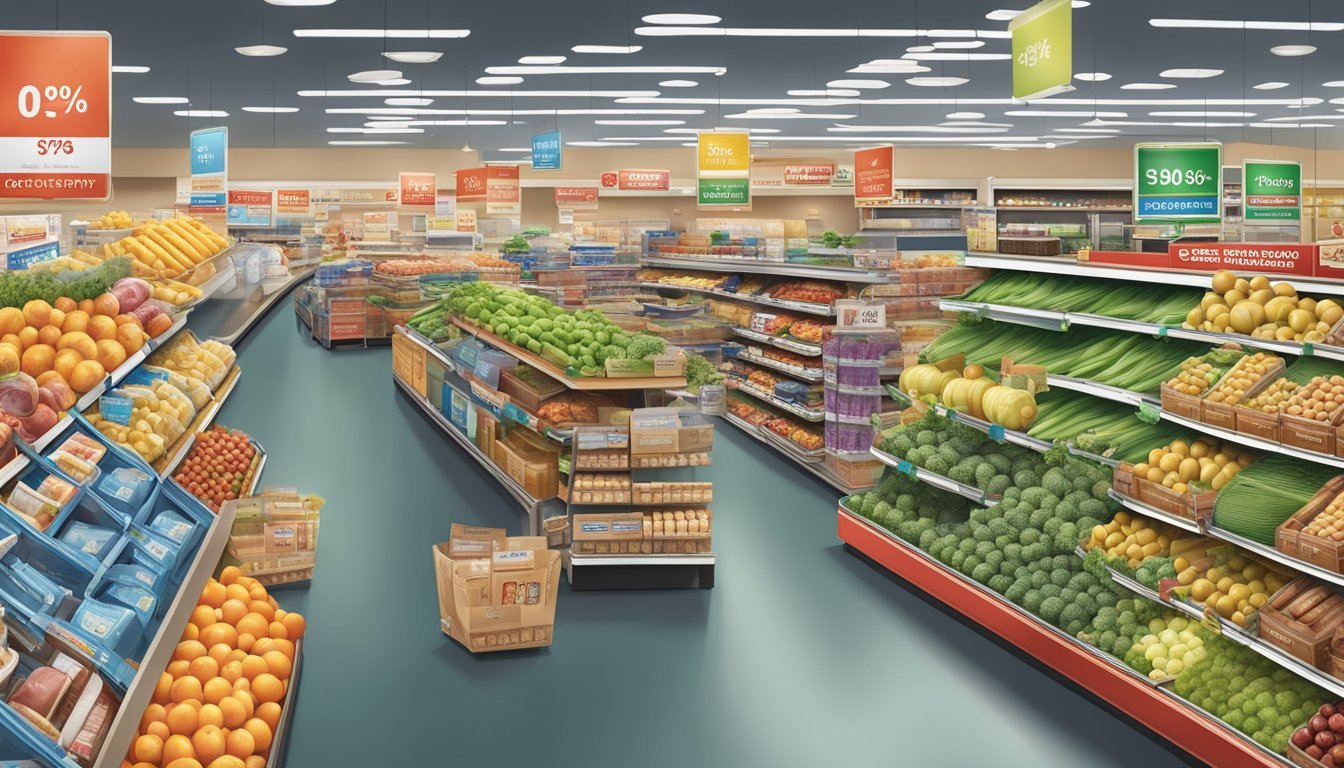Costco vs Ingles Markets
A Comprehensive Comparison of Prices, Selection, and Quality
Costco and Ingles Markets are two popular grocery store chains that cater to different shopping preferences. Costco is known for its bulk buying options and vast warehouse-style stores, offering a wide range of products beyond groceries. Ingles Markets, on the other hand, focuses primarily on traditional grocery items and operates as a regional chain in the southeastern United States.
When comparing these two retailers, several factors come into play, including product selection, pricing, and overall shopping experience. Costco generally offers lower prices on many items due to its bulk purchasing model, while Ingles Markets provides a more conventional grocery shopping experience with a focus on local products and personalized service.
Both stores have their strengths and appeal to different consumer needs. Costco's membership model and large-scale operations allow for competitive pricing on a variety of goods, making it attractive for those looking to save money on bulk purchases. Ingles Markets, with its smaller footprint and regional focus, may be more convenient for everyday shopping needs and offers a more intimate atmosphere.
Overview of Grocery Store Landscape
The grocery store landscape in the United States has evolved significantly over the past century. Consumers now have a wide variety of options, from traditional supermarkets to discount chains and specialty stores. This diversity reflects changing shopping habits and preferences.
Rise of Grocery Chains in the United States
The first self-service grocery store, Piggly Wiggly, opened in 1916, revolutionizing food retail. This model quickly spread, leading to the emergence of regional and national chains. By the 1930s, A&P had become the world's largest retailer with over 15,000 stores.
In the post-war era, supermarkets grew larger and more diverse. Kroger, Safeway, and others expanded rapidly. The 1960s and 70s saw the rise of discount chains like Walmart and Target entering the grocery market.
Today, the landscape includes traditional chains (Kroger, Publix), discount stores (Aldi, Walmart), warehouse clubs (Costco, Sam's Club), and specialty retailers (Whole Foods, Trader Joe's). Online grocery services from Amazon and others are also reshaping the industry.
Consumer Shopping Patterns and Preferences
Modern grocery shoppers prioritize convenience, value, and quality. Many consumers split their shopping between multiple stores to find the best deals and products.
60% of shoppers visit more than one store per week
78% use smartphones while shopping for price comparisons or coupons
25% have tried online grocery ordering
Price remains a top factor, benefiting discount chains like Aldi and Walmart. However, quality and selection drive traffic to specialty stores like Whole Foods and local markets.
Store layout and experience are increasingly important. Wegmans and H-E-B have built loyal followings through excellent customer service and in-store amenities. Meanwhile, smaller format stores are gaining popularity in urban areas.
Sustainability and health concerns influence choices, with organic and local products seeing strong growth. Retailers are adapting by expanding these offerings and improving transparency about product sourcing.
Costco and Ingles Markets Company Profiles
Costco Wholesale Corporation and Ingles Markets Incorporated are two prominent players in the grocery retail industry. Both companies operate distinctive business models catering to different customer segments and geographic regions.
Costco Wholesale Corporation Overview
Costco is a global retail giant known for its membership-based warehouse club model. Founded in 1983, the company has grown to over 566 locations worldwide. Costco offers a wide range of products, from groceries to electronics, at competitive prices.
The company's success stems from its bulk-selling strategy and exclusive Kirkland Signature brand. Costco's annual membership fee provides a steady revenue stream and fosters customer loyalty.
Costco stores are typically large, averaging 146,000 square feet. They carry a limited selection of high-quality items, often in bulk quantities. This approach allows for efficient inventory management and cost savings passed on to customers.
Ingles Markets Incorporated History
Ingles Markets, founded in 1963, operates as a regional supermarket chain primarily in the Southeastern United States. The company has grown to approximately 201 locations across six states.
Ingles Markets focuses on providing fresh, high-quality products with an emphasis on locally sourced items. The company maintains a strong presence in rural and suburban areas, often serving as a community cornerstone.
Unlike Costco, Ingles Markets does not require a membership. The company offers a more traditional grocery shopping experience with a wider variety of products in smaller quantities.
Ingles Markets has developed its own line of store brands, providing value alternatives to national brands. The company's stores are typically smaller than Costco's, allowing for a more personalized shopping experience.
Comparative Analysis of Shopping Experience
Costco and Ingles Markets offer distinct shopping experiences that cater to different customer needs. Their approaches to store layout, cleanliness, and customer service impact how shoppers navigate and interact within each environment.
Store Layout and Navigation
Costco's warehouse-style layout features wide aisles and bulk displays. Products are often stacked on pallets or shelves, emphasizing quantity. The store's open floor plan allows for easy movement, but finding specific items can be challenging due to frequently changing product locations.
Ingles Markets adopts a more traditional grocery store layout. Aisles are clearly labeled, making it easier for customers to locate specific products. The store's design caters to routine shopping trips, with departments like produce, bakery, and deli strategically placed for convenient access.
Families may find Ingles more navigable for quick trips, while Costco's layout suits those buying in bulk or browsing for deals.
Cleanliness and Store Maintenance
Costco maintains a clean environment despite high traffic. Their concrete floors and simple shelving are easy to clean and maintain. The store's open layout allows staff to quickly address spills or messes.
Ingles Markets prioritizes a polished appearance. Their stores often feature carpeted areas in certain departments, creating a homier feel. Regular cleaning schedules ensure shelves, floors, and checkout areas remain tidy throughout the day.
Both chains invest in cleanliness, recognizing its importance to customer satisfaction and food safety standards.
Checkout Efficiency and Customer Service
Costco's checkout process can be time-consuming during peak hours due to large cart sizes. However, they often open additional registers to manage flow. Their staff is trained to efficiently scan and pack bulky items.
Ingles Markets typically offers more checkout lanes, including express options for customers with fewer items. Self-checkout kiosks are common, providing an alternative for quicker transactions.
Customer service at Costco focuses on membership perks and returns. Ingles emphasizes personalized assistance, with staff often available to help locate products or answer questions about local brands.
Both stores strive for efficiency, but their approaches differ based on their business models and customer expectations.
Product Assortment and Quality
Costco and Ingles Markets offer distinct product selections and quality levels. Their approaches to fresh goods, organic options, and brand offerings shape the shopping experience for customers.
Comparison of Produce and Fresh Goods
Costco excels in bulk offerings of fresh produce, meats, and dairy. Their fruits and vegetables are often packaged in larger quantities, catering to families or frequent shoppers. Ingles Markets provides a more traditional grocery store selection, with loose produce and smaller package sizes.
Both stores prioritize freshness, but Costco's rapid inventory turnover can result in exceptionally fresh items. Ingles Markets, being a regional chain, often sources produce from local farms, potentially offering fresher seasonal items.
In the meat department, Costco is known for high-quality cuts at competitive prices. Ingles Markets provides a standard selection of meats, with occasional specialty items.
Availability of Organic and Specialty Items
Costco has significantly expanded its organic produce selection in recent years. They offer a range of organic fruits, vegetables, and packaged goods at competitive prices. Ingles Markets also stocks organic options, though the selection may be more limited.
For specialty items, Ingles Markets often has an advantage due to its focus on regional tastes. They're more likely to carry local specialties and niche products that reflect the preferences of their southeastern U.S. customer base.
Costco's specialty items tend to rotate, with international foods and gourmet products appearing seasonally. Their selection is broader but less consistent than Ingles Markets.
Private Labels vs National Brands
Costco's Kirkland Signature brand is renowned for its quality and value. It spans numerous product categories, from groceries to household items. Kirkland products often match or exceed the quality of national brands at lower prices.
Ingles Markets offers its Laura Lynn private label. While not as extensive as Kirkland Signature, Laura Lynn provides budget-friendly alternatives across various product lines. The brand focuses on everyday staples and competes well on price with national brands.
Both stores stock popular national brands, but Costco's selection is more limited due to its bulk-buying model. Ingles Markets typically offers a wider variety of national brand choices in standard sizes.
Pricing Strategies and Consumer Savings
Costco and Ingles Markets employ distinct pricing strategies that impact consumer savings. These approaches reflect their business models and target demographics, influencing the cost of staples like meat, eggs, milk, and bread.
Membership Pricing and Bulk Buying at Costco
Costco's pricing strategy revolves around its membership model and bulk purchasing. Members pay an annual fee for access to discounted prices on large quantities. This approach often leads to significant savings on items like meat, eggs, and milk.
Costco offers competitive prices on cage-free eggs and various cuts of meat. Bulk packages of beef can provide substantial savings for larger households. The store's private label, Kirkland Signature, often offers quality products at lower prices than national brands.
Costco's pricing on staples like sugar, bread, and whole milk is typically lower than traditional supermarkets. However, shoppers must consider storage space and product longevity when buying in bulk.
Regular Pricing and Savings at Ingles Markets
Ingles Markets uses a more traditional grocery store pricing model. They offer regular sales, weekly specials, and a loyalty program to attract customers.
Ingles' meat department often features competitive prices on various cuts. Their dairy section provides options for milk and eggs at standard grocery store prices. Bread and other baked goods are priced similarly to other supermarkets.
The Ingles Advantage Card offers additional savings and fuel points. This program can lead to significant discounts for regular shoppers. Ingles also provides digital coupons and advertised specials to help customers save on groceries.
Economic Factors Affecting Prices
Both Costco and Ingles Markets are impacted by broader economic trends. Inflation has led to price increases across the grocery industry in recent years.
Rising costs for transportation, labor, and raw materials affect the prices of staples like eggs, milk, and beef. Both stores adjust their pricing strategies to balance profitability with consumer affordability.
Seasonal fluctuations can impact prices on fresh produce and certain meats. Local economic conditions may also influence pricing in specific regions. Both retailers work to maintain competitive pricing while adapting to these economic pressures.
Corporate Responsibility and Ethical Practices
Costco and Ingles Markets demonstrate varying approaches to corporate responsibility and ethical practices. Both companies have implemented initiatives focused on sustainability, employee welfare, and animal welfare standards.
Sustainability Initiatives
Costco aligns its sustainability efforts with seven United Nations Sustainable Development Goals. The company prioritizes clean water and sanitation, responsible consumption and production, and climate action. Costco has implemented water conservation measures and works to reduce packaging waste across its operations.
Ingles Markets has taken steps to reduce its environmental impact. The company has installed energy-efficient lighting and refrigeration systems in many of its stores. Ingles also operates its own dairy processing facility, which helps reduce transportation emissions associated with milk delivery.
Employee Welfare and Community Involvement
Costco is known for its employee-friendly policies. The company offers a starting wage of $17 per hour, more than double the federal minimum wage. Costco provides comprehensive health benefits and 401(k) plans to both full-time and part-time workers.
Ingles Markets emphasizes local community involvement. The company supports regional food banks and sponsors youth sports teams in areas where it operates. Ingles also offers scholarship programs for employees and their dependents.
Animal Welfare Standards
Costco has implemented animal welfare policies for its suppliers. The company requires cage-free eggs and has committed to sourcing pork from suppliers that do not use gestation crates. Costco also works with its beef suppliers to ensure humane treatment of cattle.
Ingles Markets has made efforts to improve animal welfare in its supply chain. The company offers a selection of cage-free eggs and has increased its offerings of organic and free-range meat products. However, specific details about Ingles' animal welfare standards are less publicly available compared to Costco's policies.
Consumer Loyalty and Brand Perception
Costco and Ingles Markets have cultivated distinct consumer bases through their unique approaches to customer service, product offerings, and brand positioning. These factors significantly influence customer loyalty and shape public perception of each retailer.
Customer Reviews and Satisfaction Scores
Costco consistently receives high marks in customer satisfaction surveys. Its members praise the warehouse club for its quality products, competitive prices, and exceptional customer service. The retailer's Kirkland Signature brand is particularly well-regarded, often outperforming national brands in taste tests and quality assessments.
Ingles Markets, while less prominent nationally, maintains a loyal customer base in its operating regions. Shoppers appreciate the company's focus on fresh, locally-sourced produce and meats. The Laura Lynn store brand, exclusive to Ingles, has garnered a following among cost-conscious consumers seeking quality alternatives to national brands.
Both retailers prioritize customer experience, though their approaches differ. Costco's bulk-buying model appeals to families and businesses looking to save on everyday essentials. Ingles Markets caters to shoppers who value a more traditional grocery store layout and community-oriented atmosphere.
Impact of Brand Loyalty on Market Performance
Costco's strong brand loyalty translates into impressive financial performance. The company boasts high membership renewal rates, indicating customer satisfaction and repeat business. This loyalty helps Costco maintain steady growth and market share, even in competitive retail environments.
Ingles Markets, while operating on a smaller scale, leverages its regional presence to foster customer loyalty. The company's focus on understanding local preferences and supporting community events has helped it maintain a stable market position in its operating areas.
Brand loyalty impacts purchasing decisions, with Costco members often choosing to buy from the retailer even when competitors offer similar products. Ingles' loyal customers appreciate the familiarity and consistency of their local stores.
Influence of Reputation on Consumer Choices
Costco's reputation for offering high-quality products at competitive prices attracts value-conscious consumers. The company's ethical business practices, including fair wages and benefits for employees, further enhance its public image and influence purchasing decisions.
Ingles Markets' reputation centers on its commitment to freshness and local sourcing. This perception appeals to consumers who prioritize supporting regional producers and enjoying farm-to-table quality in their grocery shopping.
Both retailers benefit from positive word-of-mouth marketing, with satisfied customers recommending their preferred store to friends and family. This organic promotion reinforces existing loyalty and helps attract new customers, contributing to each company's growth and market position.
Final Comparative Summary
Costco and Ingles Markets offer distinct shopping experiences with unique strengths and drawbacks. Their differences in product selection, pricing strategies, and store formats cater to varied consumer preferences and shopping habits.
Summary of Key Differences
Costco operates as a warehouse-style retailer, focusing on bulk purchases and a limited selection of high-quality items. The store requires a membership fee but offers competitive prices on large quantities. Ingles Markets, in contrast, functions as a traditional grocery store with a wider variety of products in smaller quantities.
Costco excels in providing bulk deals on groceries and household items, making it ideal for large families or those who prefer to stock up. Ingles Markets offers a more diverse product range, including local and specialty items, catering to shoppers who prefer more frequent trips and smaller purchases.
Pricing strategies differ significantly between the two. Costco maintains lower margins on individual items, relying on high sales volumes and membership fees. Ingles Markets employs a more traditional pricing model with regular sales and promotions.
Deciding Which Grocery Store Suits Your Needs
Choosing between Costco and Ingles Markets depends on individual shopping habits and preferences. Costco may be more suitable for those who:
Have storage space for bulk items
Prefer to shop less frequently
Are willing to pay a membership fee for access to lower prices
Have larger households or businesses
Ingles Markets might be a better fit for shoppers who:
Prefer a wider variety of products in smaller quantities
Enjoy more frequent shopping trips
Seek local and specialty items
Don't want to commit to a membership fee
Consider your budget, storage capacity, and shopping frequency when deciding. Some consumers may benefit from using both stores strategically, taking advantage of Costco's bulk pricing for non-perishables and Ingles Markets for fresh produce and specialty items.









